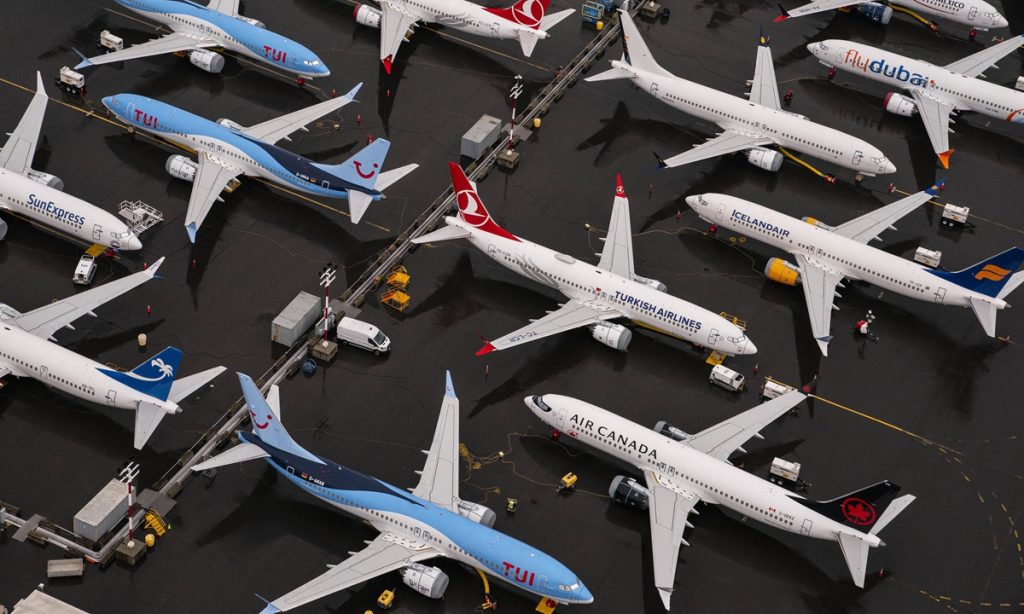GT Voice: Boeing crisis shows danger of US protectionism bubble

The escalating crisis of Boeing is giving rise to mounting frustration and anger within the aviation industry, as repeated safety problems of the American aviation giant, which highlight its poor quality control, along with regulatory failures and narrow-minded US industrial policies, clearly can't easily be fixed.
Two US airlines have cast doubt on Boeing 737 MAX plane orders. Scott Kirby, CEO of United Airlines, one of the biggest buyers of Boeing jets, said in an interview with CNBC on Tuesday that the MAX 9 groundings are "probably the straw that broke the camel's back," signaling to the carrier it should seek "alternative plans" for its aircraft inventory.
In another interview on NBC on Tuesday, Alaska Airlines CEO Ben Minicucci revealed the carrier found "some loose bolts on many" Boeing 737 Max 9 planes. "I'm more than frustrated and disappointed. I am angry," he said, according to excerpts of the interview.
There is every reason for airlines like United and Alaska to be disappointed. For the aviation industry, safety is the utmost bottom line, as any problem is likely to cause significant damage to life and property. Boeing's safety problems have posed a great challenge, becoming a major disruptor of the operation of airlines.
Indeed, United Airlines just warned investors that it will report a larger-than-expected loss in the first quarter because of the grounding of all 737 MAX 9 jets after a door plug blew off on an Alaska Air flight on January 5.
If anything, the CEOs' comments suggest that the safety crisis is not something that Boeing can quickly or easily quell. This is because since the crisis began earlier this month, reports of various safety problems about Boeing aircraft have continued to surface, indicating that its quality controls are facing a serious systemic problem, which cannot be easily fixed by addressing an isolated case.
For instance, a Boeing 757 aircraft lost its nose tire moments before it was supposed to take off from Hartsfield-Jackson Atlanta International Airport on Saturday, Fox Business reported on Tuesday.
Also last week, US Secretary of State Antony Blinken was forced to change planes to return to Washington from Davos after the Boeing 737 aircraft he was supposed to board suffered a critical failure related to an oxygen leak.
There has been a lot of analysis as to why Boeing is plagued by repeated mechanical mishaps, such as its over-reliance on parts outsourcing for the purpose of maximizing profits and negligence of quality control.
But these may just be superficial issues. Fundamentally speaking, Boeing's management problems that have led to defects in aircraft production are inseparable from regulatory failure and government protection.
Due to limited resources, the Federal Aviation Administration has long outsourced some of its oversight responsibilities to Boeing and other manufacturers for self-certification, according to an NPR report, meaning that Boeing has played a role as "both athlete and referee" when it comes to safety supervision.
The US government has been one of Boeing's biggest customers and its biggest supporter. It is no secret that Boeing has long been one of the largest beneficiaries of tax breaks, subsidies and loans.
When it comes to trade disputes, the US government imposed tariffs on Airbus to protect Boeing's position in the US market. Also, US officials have been pushing other countries to buy Boeing products, sometimes by offering loans.
Boeing's decline in competitiveness is due partly to the excessive support by the US government, which has made the giant lose its sense of urgency about quality controls and other issues affecting its competitive edge.
It's clear that American influence has become a more powerful guarantee of market share than production competitiveness. But such protection can backfire.
If Boeing continues to rely on US government influence around the world, rather than really addressing its safety problems, it may become the "spoiled child" of high-end manufacturing in the US and lose its pivotal position in the American manufacturing industry.
Whatever happens to Boeing, the US still leads in some manufacturing areas. As the US tries hard to bring manufacturing jobs back to the country, Boeing's crisis is worth reflecting on for the American manufacturing industry. If US industrial policy continues to be propped up by protectionism, the competitiveness of US manufacturing is bound to be cast into doubt.